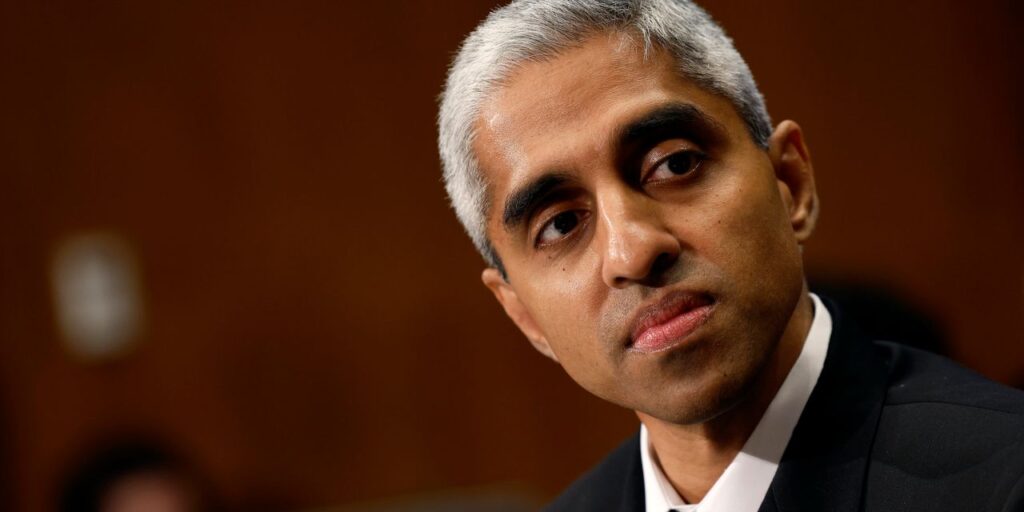Loneliness and social-media use are two of the root causes of poor mental health among young people, U.S. Surgeon General Vivek Murthy said Thursday. While loneliness cannot be legislated away, there is more that Congress should be doing to address those problems, including through community-building programs and policies that protect children from the harms of social media, he said.
In testimony before the Senate Committee on Health, Education, Labor and Pensions, Murthy said the U.S. is facing a mental health “crisis” that is having an especially acute effect on younger Americans.
In 2021, 33% of teenagers reported having poor mental health, 40% reported feeling sad or hopeless and 20% reported seriously considering suicide, the Centers for Disease Control and Prevention found. Suicide is the second-leading cause of death for Americans ages 10 to 14 and the third-leading cause of death for all U.S. teenagers.
The COVID-19 pandemic exacerbated this crisis, according to the CDC. They found the rate of sadness or hopelessness among teens in 2021 was 14% higher than the rate in 2019, and the number of high school students who reported creating a suicide plan in 2021 increased by 13% since 2019.
In 2022, President Joe Biden signed the Bipartisan Safer Communities Act into law to support the creation of state mental-health programs, especially in schools. The legislation allocated over $13 billion in federal funding to augment mental-health services.
Deputy Assistant Education Secretary for Special Education Katherine Neas testified at the same hearing that the department’s priority is increasing the number of mental-health professionals in schools and bolstering their knowledge. Neas said the funding provided by BSCA strengthened the department’s efforts to address these goals.
Murthy said that existing efforts by the government to improve mental health among young people are beneficial but they fail to address the fundamental reasons behind the problem. “I don’t think we will be able to keep up with the disturbing trends we are seeing in terms of increased mental-health concerns unless we simultaneously attack some of these root causes,” he said.
Murthy expressed concern that “we have become a lonely and disconnected nation, and that has massive consequences for our mental health, our physical health, our economic prosperity, our ability to pull together in the face of adversity.”
The surgeon general also identified social media as a leading cause of the mental-health crisis. On average, U.S. teenagers spend 3.5 hours a day on social media, he said. Yet, according to Murthy, studies show that young people who spend more than three hours a day on social media face double the risk of poor mental health. Social-media use has also been shown to interfere with in-person interactions, physical activity and sleep.
Children who use social media may also be exposed to violent, sexual or negative content in addition to bullying and harassment. The Boston Children’s Hospital Digital Wellness Lab found almost 50% of adolescents said they feel worse about their bodies after using social media, and 60% of adolescent girls reported contact from strangers on the internet that made them uncomfortable.
Murthy suggested several steps Congress could take to address these issues, including enforcing age limits and imposing standards for safety and for data privacy and transparency. He noted that social-media companies do not fully disclose data about the health effects of their platforms. Requiring data transparency would allow researchers to better understand the health consequences of social-media use and help legislators identify the most effective ways to protect children.
He also said that safety standards would allow companies to assure the public that they are “not exposing kids to harmful content, not in fact allowing kids to be bullied and harassed online by strangers, not promoting the use of features that lead to excessive use.”
He acknowledged that individual social-media companies have made efforts to implement protective measures for children. The U.S. version of TikTok has an “under 13 experience” which includes additional privacy and safety features for users under 13 years old. Federal regulations prohibit websites from deceptive or unfair practices regarding data from children, defined as those younger than 13. Many social-media platforms, like Meta’s
META,
Facebook and Snap’s
SNAP,
Snapchat, say users must be 13 to register for an account. Despite those rules, however, 40% of children between the ages of 8 and 12 use social media, Murthy said.
“Social-media platforms have been around for 20 years,” Murthy said. “If we are going to rely on them to fix this problem, we are waiting for something that’s not going to happen.”
Read the full article here











